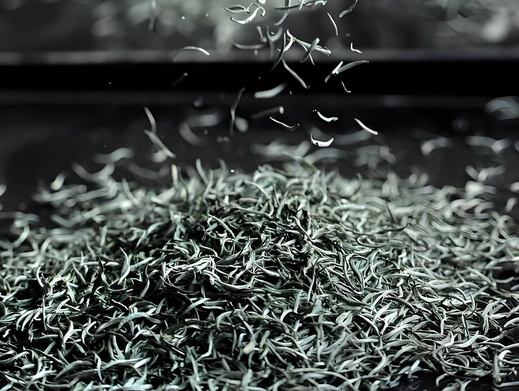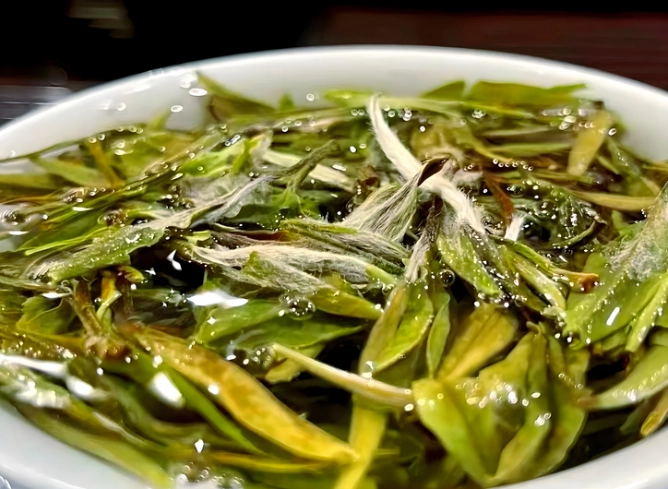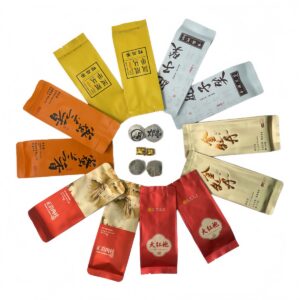Imagine the morning sunlight filtering through a window as you lift a steaming cup of delicate white tea. The amber brew is light and translucent, with wisps of floral aroma rising into the air. For many health-conscious tea lovers and busy office workers, a cup like this promises a gentle lift – but how much caffeine is really in that cup?
In this article, we explore white tea caffeine content in depth. You’ll discover how white tea compares to other teas and coffee, what affects its caffeine levels, and why this elegant brew can be a soothing alternative for focus and energy. We’ll also highlight Tanbiwencha’s premium white teas as a tasty recommendation for anyone seeking quality and flavor in their cup.
What Is White Tea? An Elegant, Light Brew
White tea comes from the Camellia sinensis plant – the same source as green, oolong and black teas – but it is the least processed. Young buds and leaves are picked early, with minimal oxidation, to preserve a delicate flavor. The result is a tea with subtle floral aroma, a smooth mouthfeel, and a soft golden infusion. Unlike robust black teas or bold coffees, white tea tastes wonderfully mild and natural. It often conjures images of dew-kissed tea buds and slow, mindful brewing. Despite its gentle character, white tea is not caffeine-free. The caffeine is simply more subtle.

Does White Tea Contain Caffeine? (Spoiler: Yes!)
Yes – white tea does contain caffeine. In fact, all true teas (green, black, oolong, etc.) have naturally occurring caffeine, since they come from the tea plant. White tea’s caffeine content is often lower on average than in black tea or coffee, but it can still give you a mild buzz. The exact white tea caffeine content varies widely. A scientific analysis found that brewed teas – white, green, or black – can contain anywhere from about 14 to 61 mg of caffeine per 6–8 oz cupresearchgate.net. Importantly, researchers observed no clear trend between tea color and caffeine content – meaning a white tea might be weaker or stronger in caffeine than some green or even black teas. What is generally true is that most brewed teas have significantly less caffeine per cup than coffee. In other words, your white tea latte is usually much gentler on the jitter meter than an equivalent brew of coffee.
How Much Caffeine Does White Tea Have? Comparing the Numbers
On average, an 8-ounce cup of white tea contains about 15–30 mg of caffeine – a modest amount compared to other teas and coffee. To put that in perspective:
- White Tea (8 oz): ~15–35 mg (often on the low end for true teas).
- Green Tea (8 oz): ~20–45 mg.
- Black Tea (8 oz): ~40–70 mg.
- Standard Coffee (8 oz): ~95–120 mg.
- For example, Danfe Tea notes a typical white tea cup has roughly 30–35 mg of caffeine, versus about 95–120 mg in coffee. A classic silver needle or white peony tea might be on the lower side (think 10–30 mg), while an aged or bud-heavy white tea could creep higher (up to 60 mg in some cases).
Because of this, an everyday cup of white tea is often about half to two-thirds less caffeinated than black tea, and roughly 60–80% less caffeinated than coffee. In fact, one tea sommelier points out that a cup of white tea contains about 40% less caffeine than a cup of coffee. So if you’re cutting back on caffeine but still want a little morning or afternoon lift, white tea’s gentle buzz might be just right.
White Tea vs Other Teas: Debunking Caffeine Myths
There are a lot of tea myths out there. Some say “white tea is caffeine-free” or “light-colored tea means no caffeine.” In reality, white tea can be as caffeinated as other teas if brewed strongly. Here’s a quick caffeine showdown (per 8oz cup):
- White Tea – 15–30 mg (often lowest, but can sometimes match green tea)
- Green Tea – 20–45 mg
- Oolong Tea – 30–50 mg
- Black Tea – 40–70 mg
As you can see, white tea usually sits at the bottom of the range, but overlaps: a bold white tea might have more caffeine than a weakly brewed green tea. It all depends on leaves and brewing (more on that below). The key takeaway: all true teas have caffeine, and white tea typically has moderate levels – enough to gently perk you up without overwhelming you.
White Tea Caffeine vs Coffee: A Calm Alternative
For coffee lovers eyeing the tea world, white tea can be a delightful alternative. While a standard cup of coffee packs around 100 mg of caffeine, our white tea brew is often just 20–40 mg. That means you can sip multiple cups of white tea over the morning without the jitters or caffeine crash that coffee often brings. Plus, white tea contains L-theanine, an amino acid that promotes relaxation and focus. The result? You get a clear-headed alertness. In fact, one study found that drinking green (and by extension white) tea significantly improved alertness, even though black tea (with higher caffeine) had similar stimulating effectscambridge.org. This suggests that tea’s gentle caffeine pairs with other compounds to boost mood and cognition in a smooth way. So if you wonder “white tea caffeine vs coffee”, remember: white tea’s buzz is softer, not weaker in enjoyment. It’s the difference between a turbo engine and a smooth electric motor – both move you forward, but one glides you there.
In practice, replace that mid-morning latte with white tea, and you’ll still feel awake enough to power through emails – but without the high blood pressure spike. Scientists have noted “in most instances…tea contains less caffeine per serving than brewed coffee”. Indeed, you’ll generally consume only a fraction of coffee’s caffeine with each cup of white tea. This can be a game-changer for those monitoring their intake.
White Tea for Office Workers: Energize Without the Jitters
Office workers, rejoice! White tea is tailor-made for your workday routine. Imagine an elegant white porcelain mug on your desk, filled with warm, pale tea that smells subtly of honey and spring flowers. As you sip, you gain a gentle alertness that helps you focus on tasks, yet you remain calm and collected – no racing heartbeat. White tea is literally what your cubicle needs to outsmart that 3pm slump. With white tea caffeine content lower than coffee, you can drink more than one cup in succession. You’re unlikely to overdo it because even six cups still often stay below a single strong coffee’s dose. And thanks to its amino acids, white tea actually offsets some caffeine’s edge: you’ll be attentive but not antsy.
For many professionals, white tea becomes a preferred coffee alternative. Instead of gulping down dark roast, they sip white tea to recharge. Health-conscious staffers love that it hydrates and delivers antioxidants alongside its mild caffeine. Need a pick-me-up? Tanbiwencha’s Silver Needle or Shou Mei white teas are perfect for a refined energy boost at work. These premium leaves yield a sweet, light brew that stimulates with minimal side effects. In short, white tea feels like it was made for high-stress, high-focus environments: it offers sustained concentration without that caffeine jit. It’s the workday secret to staying productive and zen.
Factors Influencing White Tea’s Caffeine Content
Several factors determine the caffeine punch in your white tea. Here are the main ones to know:
- Leaf vs. Bud: Caffeine is concentrated in the young tea buds. Silver Needle white tea, made solely from buds, can have higher caffeine than leafier blends like White Peony. Conversely, teas with more mature leaves (like Shou Mei) often brew a bit weaker.
- Harvest and Varietal: Altitude, climate and tea cultivar play a role. Plants under stress (e.g. high altitude or low nutrients) produce more caffeine as a natural pesticide. So a Fujian tea might differ from a Darjeeling white even with the same leaf quality.
- Brewing Time & Temperature: The longer and hotter you steep, the more caffeine gets extracted. Brewing at 175–180°F (not boiling) and for 3 minutes yields a gentle cup. Shorten to 1–2 minutes for an even lighter sip. Keep this in mind if you want to dial down the caffeine content: shorter, cooler infusions will tame it.
- Tea Amount and Cups: Simply, the more tea (or the more cups) you consume, the more caffeine. An extra tablespoon of leaves or a bigger mug means extra milligrams.
- Tea Form: Loose-leaf white tea typically infuses more gently than dust-filled tea bags. Tea bags often contain fannings or dust, which release caffeine quickly. So for a lower caffeine cup, choose premium loose leaves (for example, Tanbiwencha’s loose Silver Needle bags the smallest bits, whereas their loose-leaf White Peony are whole buds/leaves).
By adjusting these factors, you can tailor your white tea caffeine content. Brew a slightly cooler pot, or do a quick first rinse of the leaves with hot water (discard that rinse). You’ll enjoy white tea’s flavor while keeping the buzz mellow.
Benefits of White Tea’s Gentle Caffeine Kick
While white tea’s caffeine dose is mild, it still offers a host of perks, especially for the health-minded:
- Smooth Energy Boost: Unlike the rapid spike-and-crash of coffee, white tea gives you a sustained lift. Caffeine blocks brain adenosine (the “sleep” signal) and boosts alertness, but in white tea its gradual release helps you avoid the jitterscambridge.org. Many find they can focus longer on projects without feeling wired.
- Enhanced Mental Clarity: Thanks to its L-theanine, white tea promotes concentration and calm. Studies show that green/white tea drinking can sharpen cognitive function even beyond what caffeine alone would do. In practice, you may notice a serene focus – perfect for crunching numbers or writing reports.
- Metabolic Support: A positive side-effect of caffeine is a slightly faster metabolism. In fact, research on laboratory animals found that white tea helped maintain body weight and increased endurance during exerciseemerald.com. This hints that white tea’s compounds can promote fat burning and fitness, making it popular among those mindful of weight and wellness. (Admittedly, the effect was noted at certain doses and in a controlled study, but it supports the idea that tea’s polyphenols work together with caffeine.)
- Rich in Antioxidants: White tea is packed with catechins and polyphenols – nature’s antioxidants. These molecules help neutralize harmful free radicals. One study even notes that white tea’s high polyphenol content is one reason it’s prized for health. The caffeine doesn’t diminish this; it may actually help stabilize some antioxidant chemicals. So with each cup, you hydrate and give your body a protective boost.
- Gentle on the Stomach: Coffee’s high acidity can upset sensitive tummies. White tea, by contrast, is very gentle, so you can sip it all day long. You get your caffeine perk, but it’s a polite perk.
In summary, white tea’s caffeine content delivers energy and benefits. It’s an ideal stimulant for health-conscious folks – enough to feel energized, with the calming partnership of antioxidants and L-theanine.
Brewing White Tea: Tips to Control Caffeine
To fine-tune your white tea experience, try these simple brewing strategies:
- Shorten the Steep: Brew for just 1–3 minutes. Less extraction equals less caffeine. That first delicate infusion (especially in Gongfu style) yields flavor but little buzz.
- Cool it Down: Use water around 175–180°F instead of boiling. Hotter water pulls out more caffeine along with bitter tannins.
- Reuse Your Leaves: White tea leaves can often do 2–3 infusions. Enjoy multiple light brews from the same leaves. Each successive steep will contain a bit less caffeine.
- Go Loose: Opt for loose-leaf white tea whenever possible. The whole leaves and buds unfurl slowly, whereas tea bags can dump caffeine quickly. For instance, a tin of loose-leaf Silver Needle (like Tanbiwencha’s) will yield a subtler brew than a bag of the same tea.
- Watch Your Ratio: Use about 1 teaspoon (2–3 g) of leaves per 6–8 oz water for a standard cup. If you halve the leaves, you nearly halve the caffeine.
By experimenting, you can make white tea caffeine content as light or bold as you like. If you’re sensitive, start with a brief steep and drink in several smaller cups rather than one giant mug. Enjoy the ritual – watch the silvery buds unfurl – and know that you’re in control of your caffeine intake.
Loose white tea leaves steep in hot water, releasing a pale golden liquor. The longer the steep, the more caffeine is in your cup – so timing is key to keep things mellow.

Tanbiwencha’s White Tea Picks: High-Quality Recommendations
If you’re ready to sip, consider trying a premium white tea from a reputable source. Tanbiwencha is known for its high-quality Chinese teas. Their Silver Needle and White Peony teas, for example, are harvested from Fuding’s ancient gardens and offer pure, delicate flavor. These special teas not only have the rich aroma and smooth taste you crave, but also strike a nice balance with their caffeine: enough to enliven your senses, yet gentle enough to savor without stress. For instance, Tanbiwencha’s aged Baihao Yinzhen white tea (silver needle) is hand-picked from wild bushes and aged to enhance sweetness – it’s a refined treat that office workers and tea enthusiasts alike adore.
Whether you choose Tanbiwencha’s white tea or another fine variety, look for whole buds and a light, silvery appearance. That’s the sign of fresh white tea that will brew a clean cup. With quality leaves, you’ll experience the full sensory magic of white tea: floral aroma, light body, and that soft lift – all complementing its mild caffeine content.
Bottom Line: Embrace White Tea’s Delicate Stimulation
White tea offers a beautiful compromise between comfort and alertness. Its caffeine content is generally low-to-moderate, but paired with an abundance of theanine and antioxidants. For tea drinkers and health nuts, that means a drink you can enjoy day after day: a little energy boost, no crash, and plenty of wellness perks. For the office crowd, swapping a midday coffee for white tea can mean calmer focus and fewer jitters, helping you meet deadlines with a steady hand.
Remember, the exact caffeine in your cup depends on the leaves and the brewing. Feel free to experiment with steep times, leaf amounts, or even switching to a lighter white tea blend (like a simple white peony) if you want to gently cut the caffeine. And if you want truly premium flavor with a mindful caffeine hit, try a quality tea like Tanbiwencha’s white teas, which are crafted for purity and richness in every sip.
In the end, white tea caffeine content is your friend – it’s enough to kindle the mind and brighten the day, without stealing the show. So next time you need a pick-me-up, pour yourself a cup of silky white tea. Breathe in its subtle sweetness. You’ll feel the lift in your spirit, even as the world outside bustles on.
Sources: Scientific analyses report white tea’s caffeine ranges (about 14–61 mg per cup) comparable to other teasresearchgate.net, and consistently show brewed tea has less caffeine than coffeeresearchgate.net. Studies on tea drinkers confirm that compounds in tea improve alertness without spikescambridge.org. Research on white tea even suggests benefits for weight and enduranceemerald.comemerald.com, supporting its gentle energy boost.



